Tired of your painful shoulder movements? Want to know more about shoulder replacement and find the best shoulder replacement surgeon in Delhi? Worry not! The shoulder joint is a ball-shaped joint where the shoulder bone connects to the body through an articular joint. In shoulder replacement surgery, the prosthetic element replaces the natural bone in the shoulder cushion and cavity.
It is highly suggested for somebody living with severe shoulder pain and incapable of moving or using the arm. These conditions happen because of injury to bare joints like cracks, tendon wounds, joint pain, etc.
Dr. Prof Amit Agarwal, an Orthopedic & Spine clinic offers ideal shoulder replacement surgery In Delhi. The prosthetic replacement is created to perform and feel natural, including regular movement and action, so that daily exercise remains a fundamental character of the rehabilitation method. The Best Spine Surgeon in Delhi and Orthopedic clinic by Dr. Amit Agarwal also performs Arthroscopy surgery. It is a method for diagnosing and healing joint difficulties. A surgeon enters a conventional tube connected to a fibre-optic video camera within a small hole, approximately the measurement of a buttonhole. The opening inside your joint is transferred to a high-definition display proctor.
Benefits of having shoulder replacement:
Our specialization:
Browse the website for the mentioned contact details and don’t wait longer. Schedule a consultation as soon as possible at our clinic today.
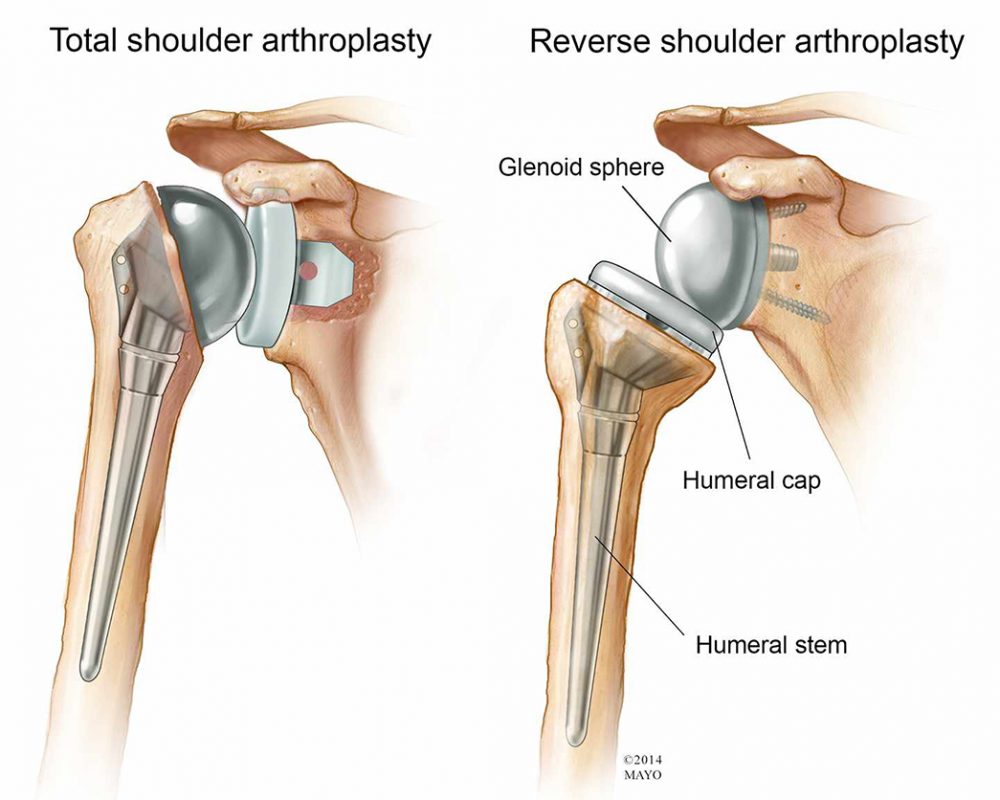

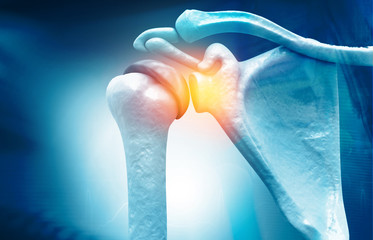
Partial thickness rotator cuff tears can be associated with chronic inflammation and the development of spurs on the underside of the acromion or the acromioclavicular joint.
The conservative nonsurgical treatment is modification of activity, light exercise, and, occasionally, a cortisone injection. Nonsurgical treatment is successful in a majority of cases. If it is not successful, surgery often is needed to remove the spurs on the underside of the acromion and to repair the rotator cuff.
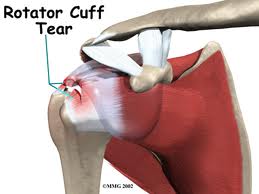
Full-thickness rotator cuff tears are most often the result of impingement, partial thickness rotator cuff tears, heavy lifting, or falls. Nonsurgical treatment with modification of activity is successful in a majority of cases
If pain continues, surgery may be needed to repair full- thickness rotator cuff tears. Arthroscopic techniques allow shaving of spurs, evaluation of the rotator cuff, and repair of some tears.
Both techniques require extensive rehabilitation to restore the function of the shoulder.
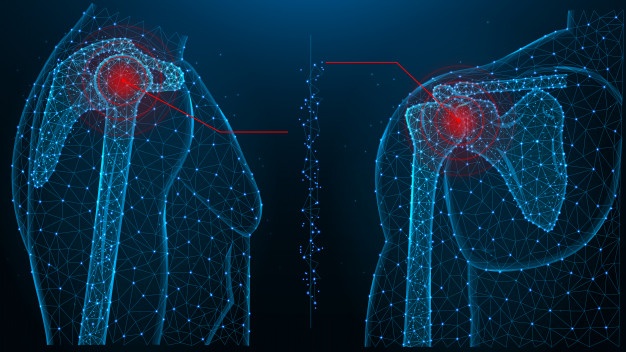
Instability occurs when the head of the upper arm bone is forced out of the shoulder socket. This can happen as a result of sudden injury or from overuse of the shoulder ligaments.
The two basic forms of shoulder instability are subluxations and dislocations. A subluxation is a partial or incomplete dislocation. If the shoulder is partially out of the shoulder socket, it eventually may dislocate. Even a minor injury may push the arm bone out of its socket. A dislocation is when the head of the arm bone slips out of the shoulder socket. Some patients have chronic instability. Shoulder dislocations may occur repeatedly.
Patients with repeat dislocation usually require surgery. Open surgical repair may require a short stay in the hospital. Arthroscopic surgical repair is often done on an outpatient basis. Following either procedure, extensive rehabilitation, often including physical therapy, is necessary for healing.
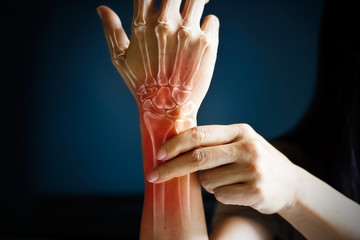
A fractured head of the humerus is a common result of falls on an outstretched arm, particularly by older people with osteoporosis. If fragmented or displaced, it may require open surgical repair and possibly replacement with an artificial joint (prosthesis).
Fractured Collarbone and Acromioclavicular Joint Separation
A fractured collarbone and acromioclavicular separation are common injuries of children and others who fall on the side of their shoulder when playing. Most of these injuries are treated non surgically with slings or splints. Severe displaced fractures or acromioclavicular joint separation may require surgical repair.

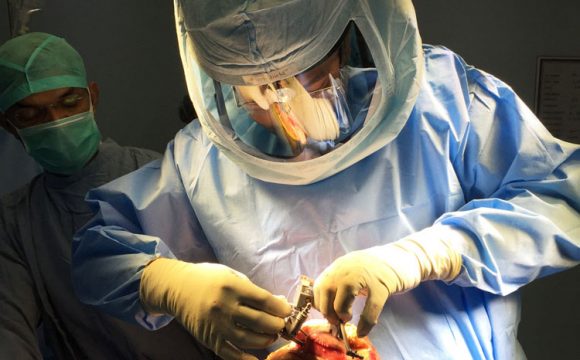
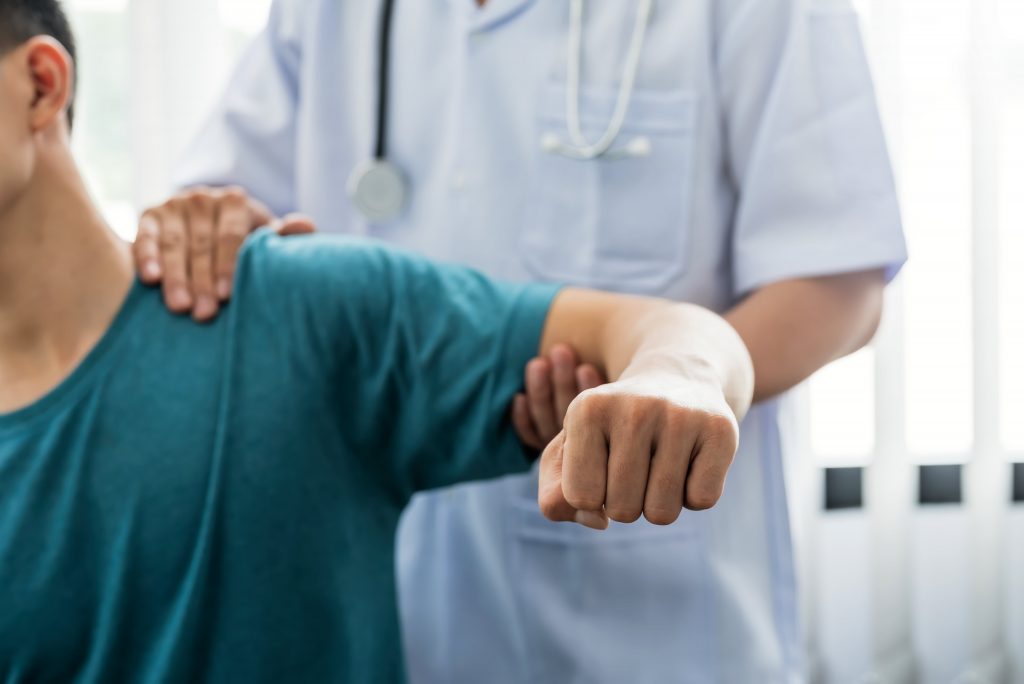
The orthopedic evaluation of your shoulder consists of three components:
A medical history to gather information about current complaints; duration of symptoms, pain and limitations; injuries; and past treatment with medications or surgery.
A physical examination to assess swelling, tenderness, range of motion, strength or weakness, instability, and/or deformity of the shoulder.
Diagnostic tests, such as X-rays taken with the shoulder in various positions. Magnetic resonance imaging (MRI) may be helpful in assessing soft tissues in the shoulder. Computed tomography (CT) scan may be used to evaluate the bony parts of the shoulder.
We will review the results of your evaluation with you and discuss the best treatment. If surgery is the best option , you will be explained the benefits vs potential risks and complications .
No food or drink after midnight before surgery. Discuss with us what to do about medications taken in the morning. Pre-anesthetic checkup prior to the surgery. You may be given the option to have an arthroscopic procedure or an open surgical procedure.
You may be given the option to have an arthroscopic procedure or an open surgical procedure.
Arthroscopy allows us to insert a pencil-thin device with a small lens and lighting system into tiny incisions to look inside the joint. The images inside the joint are relayed to a TV monitor, allowing us to make a diagnosis. Other surgical instruments can be inserted to make repairs, based on what is with the arthroscope. Arthroscopy often can be done on an outpatient basis. You can also get the treatment of Hip Replacement Surgery in Delhi for the hip pain and hip related problems.
Open surgery may be necessary and, in some cases, may be associated with better results than arthroscopy. Open surgery often can be done through small incisions of just a few inches.
Recovery and rehabilitation are related to the type of surgery performed inside the shoulder, rather than whether there was an arthroscopic or open surgical procedure.
There are always some risks with any surgery, even arthroscopic procedures. These include possible infection, and damage to surrounding nerves and blood vessels. However, modern surgical techniques and close monitoring have significantly minimized the occurrence of these problems.
After surgery, some pain, tenderness, and stiffness are normal. You should be alert for certain signs and symptoms that may suggest the development of complications.
As you can see, the shoulder is extremely complex, with a design that provides maximum mobility and range of motion. Besides big lifting jobs, the shoulder joint is also responsible for getting the hand in the right position for any function. When you realize all the different ways and positions we use our hands every day, it is easy to understand how hard daily life can be when the shoulder isn’t working well.
It is important that you continue a shoulder exercise program with daily stretching and strengthening. In general, patients who faithfully comply with the therapies and exercises prescribed by the physical therapist will have the best medical outcome after surgery.
Our Main Pages
Clinic in Delhi-NCR
Clinic in South West Delhi